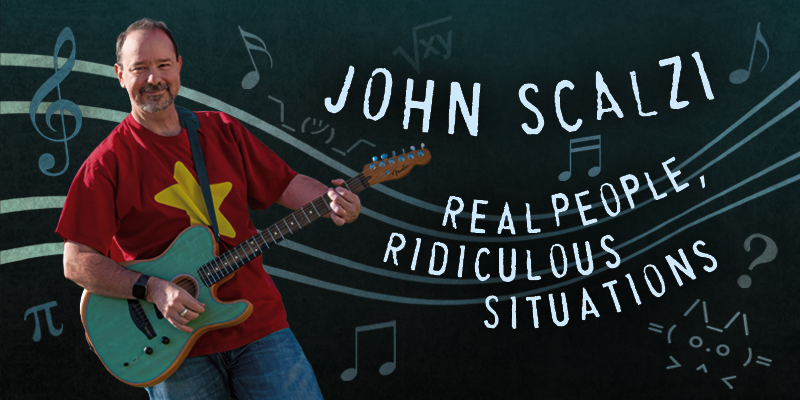John Scalzi: Real People, Ridiculous Situations

JOHN MICHAEL SCALZI II was born May 10, 1969, and grew up in Southern California, going to school in Claremont. He graduated from the Webb School in 1987 and attended the University of Chicago, where he became editor-in-chief of the Chicago Maroon and graduated with a philosophy degree in 1991. He moved back to California, where he became the film critic and later a columnist for the Fresno Bee. In 1996 he relocated to Washington DC to work for AOL as an in-house editor. In 1998 he became a full-time freelance writer, doing work for corporate clients in addition to reviewing and writing fiction. Scalzi is also a prominent blogger, with popular personal site Whatever, at <whatever.scalzi.com>.
Scalzi’s first SF novel was Agent to the Stars, posted on his website in 1999 (and published in print in 2005). Second novel Old Man’s War appeared on his website in 2002, where it was read by editor Patrick Nielsen Hayden, who subsequently purchased it for Tor. The novel appeared in print in 2005 and was a Hugo Award finalist. Other novels set in the same universe include The Ghost Brigades (2006), The Lost Colony (2007), Hugo and Norton Award finalist Zoe’s Tale (2008), The Human Division (2013), and The End of All Things (2015), plus assorted stories and chapbooks.
His humorous SF novel Redshirts (2012) won a Hugo Award. Other novels include The Android’s Dream (2006) and Fuzzy Nation (2011), an authorized “reboot” of H. Beam Piper’s classic Little Fuzzy (1962). Campbell Memorial Award finalist Lock In (2015) was followed by sequel Head On (2018).
In 2017, he signed a 13-book contract with Tor, beginning with Hugo Award finalist and Locus Award winner The Collapsing Empire (2017), first in the Interdependency series, which also includes The Consuming Fire (2018) and Dragon Award winner The Last Emperox (2020); the series as a whole was a Hugo Award finalist in 2021. Standalone The Kaiju Preservation Society appeared in 2022, is a finalist for Hugo and Dragon Awards, and won a Locus Award. His latest book is Starter Villain (2023).
Though his focus is novels, Scalzi has published a fair bit of short fiction, notably standalone novelette The Sagan Diary (2007), set in the Old Man’s War Universe; dark science fantasy novella The God Engines (2009), a Hugo and Nebula Award finalist; Hugo nominee “Shadow War of the Night Dragons: Book One: The Dead City: Prologue” (2012); a novella in the Lock In universe, Unlocked: An Oral History of Haden’s Syndrome (2014); and audio original novellas The Dispatcher (2016), Murder by Other Means (2020), and Travel by Bullet (2022). SF story “Slow Time Between the Stars” (2023) is part of the Amazon.com anthology The Far Reaches.
Some of his shorter humorous work has been collected in Miniatures: The Very Short Fiction of John Scalzi (2016) and A Very Scalzi Christmas (2019). A number of his stories have been adapted for the Netflix anthology series Love, Death & Robots, including “Missives From Possible Futures #1: Alternate History Search Results” (2007), a Sidewise Award nominee; “When The Yogurt Took Over: A Short Story” (2010); and “Three Robots Experience Objects Left Behind from the Era of Humans for the First Time” (2018).
Scalzi edited an issue of Subterranean magazine dedicated to “science fiction clichés” in 2006 and Hugo-nominated shared-world anthology METAtropolis in 2008. His non-fiction includes The Rough Guide to Money Online (2000), The Rough Guide to the Universe (2003), The Rough Guide to Sci-Fi Movies (2005), and 24 Frames Into the Future: Scalzi on Science Fiction Film (2012). He also wrote the humorous Book of the Dumb series, beginning in 2003. Some of his blog posts have been compiled in You’re Not Fooling Anyone When You Take Your Laptop to a Coffee Shop: Scalzi on Writing (2007), Hugo Award-winner Your Hate Mail Will Be Graded: Selected Writing, 1998–2008 (2008), Don’t Live For Your Obituary (2017), and Virtue Signaling and Other Heresies (2018).
Scalzi was nominated for the Best Fan Writer Hugo Awards in 2007 and 2008, winning the latter. He also won the Astounding Award for Best New Writer in 2006. Scalzi was elected president of SFWA in 2010, and served three terms, stepping down in 2013. He lives in Bradford OH with his wife, Kristine Blauser Scalzi (married 1995); they have a daughter, Athena.
Excerpt from the interview:
“I wrote Starter Villain for a couple of reasons. One was purely practical. I turned in Kaiju, and Patrick and all the folks at Tor were very enthusiastic about it. The early trade notices were really good, and the ‘light, fun, contemporary-time, high-concept’ thing was a wave that we could catch. So, in one sense, it was really a business decision – let’s do another thing like that. Starter Villain does take place in a contemporary time, and it is pretty high-concept: ‘Average Joe inherits mysterious uncle’s supervillainy business.’ The other reason was, in a ‘having fun with the things you write’ sense, I’d been thinking about villains for a while. One of the things that I think about – and this was the same case with Redshirts and Kaiju – is, when you are thinking of a really high-concept ideas, what is the practical aspect of it? How would people on a day-to-day basis live the life of someone who works with kaiju, or who works on a spaceship and may be doomed? Or, in the case of Starter Villain, someone who is shown into the deep end of a whole supervillainy conspiracy? What would the practical aspects of that be?
“For example, everybody knows that supervillains have volcano lairs. If you don’t have a volcano lair and you’re a supervillain, what even are you doing? You’re a poser. Go sit with the regular villains. But then becomes the question – and this is the thing that gets me and that I want to explore – why do you have a volcano lair? It’s not because it’s secret anymore. You can’t ignore the fact that spy satellites are above you, so what is the reasoning here? So, for a nerd, I ask this of people when I talk to them about supervillains: Why does a supervillain need a volcano lair? They’re like, ‘Ooh, I know! It’s geothermal power!’ Yes, it is geothermal power! Well done, you! You are well on your way to becoming a supervillain yourself. But, that’s the sort of fun thing about it, to take all the tropes that we know about supervillains, about James Bond, about shooting lasers into space – all that sort of stuff, and try to make it track with how this might actually work. It’s really fun for me to do that, to look at all the tropes that we are playing with. If you go to the TV Tropes site and look at the listings for Redshirts and Kaiju, they just go on and on and on. ‘Yup, he’s using this trope. Yup, he’s using this trope. Jesus, Scalzi – have you ever had an original idea? Because you’re using this trope, again.’ But that’s part of the fun: taking the expectations for these tropes and either making them plausible and reasonable, or subverting them in a fun way.
“Let’s put ordinary people into this incredibly high-concept thing and see how they deal with it. I think that’s one of the reasons people enjoy reading them, because it really is something where you can see yourself being the person who inherits the mysterious uncle’s supervillainy business. Or the person down on their luck who suddenly gets to be transported to an entirely different world. It is, in terms of reader inserts, fun and easy to do.
“A lot of my technique is honestly just practical: Don’t write really long sentences. It sounds ridiculous when I put it that way, but it’s true: Don’t write a long sentence unless you intend to have a long sentence. And, also, put in lots of dialogue, so that people are having conversations, and conversation moves really quickly. But you have to break up the conversation scenes with, every once in a while, action. For example, I have a scene where Charlie, the main guy, is talking to the Godfather of the criminal conspiracy, and they’re just, ‘Blah blah blah’ – and then, suddenly, there’s an assassin! It sounds kind of foolish, but it really made for the rhythm of, ‘Here’s some exposition that you need to know, it’s cleverly done’ – then, all of a sudden, it’s broken up by this attempted assassination, and this attempted assassination goes in a way you don’t expect it to go. There is the establishing scene of conversation, there is the disruption, there is the subversion of expectation, and then, you continue on. All with a lot of humor, which keeps things going a little more quickly, as well, because humor feels fast – comedy feels fast. It’s very hard to do comedy in a slow, drawn-out way because so much of what makes us laugh is subversion of expectation that needs to be done instantly. In that sense, I’m just paying attention to the rhythms of where the story should go and what it wants to do.
“There is that old saying that whenever you are stuck in a scene, have somebody come in with the gun – Raymond Chandler said that, and it’s absolutely correct. It’s like, ‘Hmm, the scene seems to be going on a lot – drop in an assassin!’ Or, in my case, with completely different books: have a spaceship blow up! There’s a great quote from The Good Place – one of the characters, Jason, has this great line that is super good writing advice. He says, “Any time I had a problem, and I threw a Molotov cocktail, boom! Right away, I had a different problem.’ It’s super great writing advice because it’s not going to solve your problems, but it gives you something else to focus on, and maybe you can write your way out of that. When Jason said that in The Good Place, that was absolutely 100% the writer popping their head out and saying, ‘Just so you know, this is what we do.’
“That is how you do it: You establish something, you subvert the expectations, and you play with the changes of that. And, in the case of Jason, he goes full circle. He starts off faking having wisdom, and at the end, he actually has gained it. To the same extent, a lot of the characters in my lighter work start off being thrown into the deep end, not knowing what to do, and eventually come full circle with their desires and expectations. Without spoiling the book, I’ll say that is actually some of the journey that Charlie, the main character of Starter Villain, has. He starts off having a very specific dream to change his life. His life changes in way that he doesn’t expect, and at the end of it, he comes back to what his initial dream was, and why it was that he wanted it. He has completely different expectations for it, now. You want to have that journey. I don’t want to go full Joseph Campbell or something, but you do want to have the character earn their arc, regardless of what that arc might be.
“If your work doesn’t have heart, the comedy ends up being a bit hollow. Starter Villain or Kaiju or Redshirts are incredibly high-concept books, but if you only play it as farce, if you only do it for the wink-wink-nudge-nudge joke, it becomes exhausting. Your characters need to be real people, or, close enough to real people that readers can identify with the fact that even though all this ridiculous stuff is happening to them, they are responding like somebody who is recognizably human – someone that could be you. Charlie doesn’t come in being a master villain. Charlie responds like anybody would who was in over their head and smart enough to know.
Interview design by Francesca Myman.
Read the full interview in the September 2023 issue of Locus.
 While you are here, please take a moment to support Locus with a one-time or recurring donation. We rely on reader donations to keep the magazine and site going, and would like to keep the site paywall free, but WE NEED YOUR FINANCIAL SUPPORT to continue quality coverage of the science fiction and fantasy field.
While you are here, please take a moment to support Locus with a one-time or recurring donation. We rely on reader donations to keep the magazine and site going, and would like to keep the site paywall free, but WE NEED YOUR FINANCIAL SUPPORT to continue quality coverage of the science fiction and fantasy field.
©Locus Magazine. Copyrighted material may not be republished without permission of LSFF.








